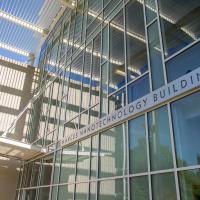Recently, GTRI leadership and research faculty were joined by State of Georgia leaders, corporate representatives, and educators to celebrate a notable milestone for an important GTRI program. STEM@GTRI celebrated its 25th anniversary recently. STEM @GTRI is the Georgia Tech Research Institute's K-12 outreach program. STEM @GTRI strives to…
Stefan Abi-Karam, a member of the Georgia Tech Research Institute (GTRI) and a Ph.D student in the School of Electrical and Computer Engineering at Georgia Tech, has been honored with the prestigious FPL Community Award at the 33rd International Conference on Field-Programmable Logic and Applications (FPL 2023) in Gothenburg, Sweden. Abi-Karam, a…
The American Mathematical Society (AMS) recently announced top honors for three School of Mathematics professors, including a top research award and a pair of faculty recognized as AMS Fellows for their work in advancing the field. Levi L. Conant Prize School of Mathematics Associate Professor Jennifer (Jen) Hom has received the 2024 Levi L.…
In an article published this week in Nature Human Behaviour, computational science and engineering Assistant Professor Srijan Kumar and his colleagues describe why new behavioral science interventions are needed to tackle AI-generated disinformation.Generative artificial intelligence (AI) tools have made it easy to create realistic…
A Georgia Tech researcher has successfully evaded security measures on Apple’s latest MacBook Pro with the M3 processor chip to capture his fictional target’s Facebook password and second-factor authentication text. By the end of his demonstration video, Ph.D. student Jason Kim showed how the recently discovered iLeakage side-channel…
Imagine a household that consumes 1,000 kilowatt hours of energy per month. Then they install solar panels on their roof that generate 500 kilowatt hours of electricity per month on average. How much should their consumption of electricity drawn from the power grid decline after they install solar? Five hundred kilowatt hours is the expectation,…
Three out of four of the world’s most popular websites are failing to meet minimum requirement standards and allowing tens of millions of users to create weak passwords. The findings are part of a new Georgia Tech cybersecurity study that examines the current state of password policies across the internet.Using a first-of-its-kind automated tool…
The Institute for Electronics and Nanotechnology (IEN) and the Institute for Materials (IMat) have announced they will combine to form a new Interdisciplinary Research Institute (IRI) set to begin operations on July 1, 2024.The new IRI, which has yet to be named, will explore the vast scientific, technological, societal, and economic impacts of…
Georgia Tech scientists will soon have another way to search for neutrinos, those hard-to-detect, high-energy particles speeding through the cosmos that hold clues to massive particle accelerators in the universe — if researchers can find them. “The detection of a neutrino source or even a single neutrino at the highest energies is like…
Workforce diversity is imperative for innovative science and technology. Yet due to funding inequities, research infrastructure isn’t as robust at Minority Serving Institutions (MSIs), making building a diverse workforce pipeline and inclusive research collaborations challenging. With its Research Collaboration Initiative (RCI), the Georgia…













